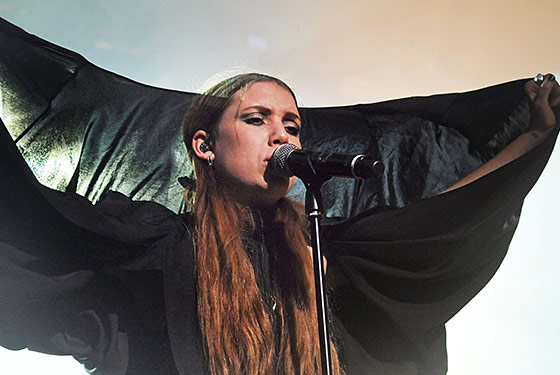
Lykke Li is 24, Swedish, and sort of awesomely self-dramatizing. I almost feel guilty including “Swedish” in that description, since she seems insistent on not being another winsome Swede. Her parents were globe-trotting arty types; she grew up in Portugal and India, too; she moved to New York when she was 19. My favorite thing about her interviews is the way she talks about Sweden, the same way a moody teenager talks about embarrassingly square parents or a stifling hometown: “I could never see myself staying in Sweden!” “Sweden is too clean I feel very dirty when I’m there.” “In Sweden they get provoked quite easily; you can piss them off quite easily.” She describes herself as a “hustler.” Two years ago, when New York Magazine asked her where she might be in a decade, she said and I can’t help imagining this being said by an indignant kid in a suburban basement “I could be dead. I could be pregnant or homeless or a volunteer in Africa.”
Let me just be clear that I find this incredibly charming about her, the way she’s forever sticking her chin out and saying things like, “I’m always so broken-hearted” or “I can recognize sadness and tragedy really easily because it’s been with me forever” and talking with rich teenage intensity, all of which is probably exactly what a pop star of her ilk should be good at.
Another thing she might find a little restrictive, at this point? The sound of her first album, 2008’s Youth Novels, which had her cooing playfully against slinky, minimalist pop — she says it’s more “timid” than she wanted it to be. And Lykke Li does not wish to be mousy or timid or girlish. The first single off her new album, Wounded Rhymes, is called “Get Some.” At one point it cuts the music so she can declare, compellingly and convincingly, “I’m your prostitute / you gon’ get some.” The track is dark and shifty, full of that clanging surf-guitar spring-reverb sound that forever and ever indicates something vaguely sinister going on in a southwestern desert.
That’s the mood Wounded Rhymes is shooting for. It was recorded in L.A., and its mental touchstones are very much of that city — as in David Lynch, or Joan Didion writing about the Doors and the Manson murders and creeping dread, or the desert itself. The drums are big and assertive, and Lykke Li’s voice, mousy no more, wants to be even bigger and more assertive: She’s dropped down into a thick middle register, and the production pumps up her vocals until they seep into every corner of every track. She sings a big dirty song and calls it “Rich Kid Blues,” which is just the right kind of playful; she sings an oppressively big girl-group tune and uses the line “sadness is my boyfriend” as a highlight. The quiet, low-and-lonesome desert songs in between are full-on low and lonesome, mostly just guitar and voice — the voice treated so it sounds fuzzy and in-the-red, like the lit coil on an electric range. There’s a cavernous, mildly spooky tune called “Jerome” that sounds like she’s trying to top the act Bat for Lashes by sheer dint of being bigger. (The best thing about it is the unique and inspired choice of the name “Jerome” to build a pop song around.)
Wounded Rhymes risks being overbearing, especially compared to the allegedly timid stuff on Youth Novels; the big, mushy, decadent wall of sound on some of these tracks can be tiring. But honestly, the brasher Lykke Li feels like being, the better; she really gets something out of it. She sounds restless and ambitious and a little perverse, and sometimes you shake your head and chuckle at her — just like in those interviews I enjoy so much.




